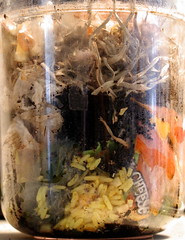Here are my 10 top personal reasons for composting. I only hope that you move your butt out of that chair and begin your own compost pile before you reach number eight!
| Turning a compost pile for viticulture (Photo credit: Wikipedia) |
#2. The second one is that compost provides more nutrients and minerals needed by my plants than commercial organic or synthetic fertilizers - it is usually a more balanced and holistic form of fertilizer. The overall effect of compost is also longer than commercially available fertilizers. It’s free and it works better - who wouldn’t want that? Plus, if you organize your ingredients just right, you can provide an even wider range of nutrients.
#3. Another good reason would be the benefits of compost to the soil structure. When applied to the soil, compost can help the soil be more resistant to erosion, improve its retention of water, and in some types of soil (like clay) it can reduce the chance of the soil becoming compacted. This is also important for farmers since compost can make the soil easier to till, conserving time and fuel needed to operate the machines.
#4. With the right composting technique, the process can kill those troublesome weeds as well as pests and disease-causing organisms present in the materials being composted. High temperature (or hot) composting is the technique I am talking about. Although, this technique is not always the backyard variety, it can be done with the right materials.
#5. There have been studies which indicate that using compost can suppress the growth of diseases in crops. Other studies also show that crops grown over compost rich soils are healthier and can better resist pest or insect attacks.
#6. Likewise, some observations in the field also show that crops grown using compost bear produce that can be stored longer. If that’s not reason enough, I don’t know what else you are looking for.
#7. For the environmentalists and conservationists, compost has something for you as well. Adding compost to the soil can build (sequester) soil carbon which can eventually reduce the carbon dioxide in the atmosphere. It may take a lot of compost to have a positive effect on the greenhouse gases but that fact is quite useful as well.
#8. It has also been found that compost works well as an antidote for soils that are toxic due to agricultural chemicals. Compost can balance the levels of soil acidity, and help farmers to go organic after years of using synthetic agricultural products.
| compost scraps (Photo credit: morganthemoth) |
#10. It's kind of fun! Seeing all those old food scraps, weeds, dead leaves, etc., turn into dark, rich compost before my eyes is so fulfilling and makes me feel like I'm doing something good for the planet, my garden, and myself.
So there you have it - my top 10 reasons for composting. Some of them may not directly benefit my personal needs, and some of mine may not be yours, but hopefully they'll motivate you to explore the use of compost for yourself in your own garden - and then you can come up with your own reasons!



No comments:
Post a Comment